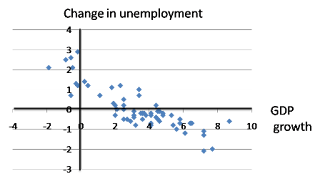Okay, I'm not a macroeconomist, so someone please tell me if I way off base here. I'm trying to figure out how reasonable or unreasonable the Obama administration's claim of 1 million jobs saved may be.
The media reports are useless. We all know that every journalist can find a Republican that says it's all bogus and the Obama administration will stand by its numbers. Sadly, none of the news reports walk through the Econ 1 and basic algebra to weigh in on the reasoning underlying the numbers. Bad reporting or stupid reporters? Which is it?
Anyway....
So, as an armchair macro guy I'll borrow Krugman's picture of Okun's law. It shows we get an extra 0.5% change in unemployment for every 1% change in GDP. There are about 150 million jobs in the U.S. so 0.5% is about 750K jobs.
So, in claiming 1 million jobs created or saved, the Obama administration is claiming GDP is about 1.33% larger than it would have been without the stimulus.
Now we have this table from the Economic Policy Institute that, in the first three quarters of 2009, found growth was about 0.3, 2.4, and 2.3 percentage points greater due to stimulus. These are quarterly rates, so we have to divide the sum by 4, which gives us an economy that is about 1.25% greater than it would have been. Now, we're a little ways into the four quarter, so maybe it's okay to fudge things upward by another 2.3/12 or so, to put this up to about 1.45.
Maybe not. You decide. In any case, we're looking at something a little less to a bit more than a million jobs by standard macro calculations. And this does look like a standard macro Keynesian boost.
While this sort of thing is generally difficult to pin down, to me a million jobs looks reasonable. If there's fudging going on, someone please tell me where and how.
Update: Brad Delong explains how to count the costs and benefits. I imagine some would quibble around the edges with his specific numbers. But he has all the right pieces and the numbers can't be far from correct. Also, I think he's assuming a multiplier of 1 when something on the order of 1.5 is probably easy to justify.
Friday, October 30, 2009
Subscribe to:
Post Comments (Atom)
Renewable energy not as costly as some think
The other day Marshall and Sol took on Bjorn Lomborg for ignoring the benefits of curbing greenhouse gas emissions. Indeed. But Bjorn, am...

-
The other day Marshall and Sol took on Bjorn Lomborg for ignoring the benefits of curbing greenhouse gas emissions. Indeed. But Bjorn, am...
-
The tragic earthquake in Haiti has had me wondering about U.S. Sugar policy. I should warn readers in advance that both Haiti and sugar pol...
-
A couple months ago the New York Times convened a conference " Food for Tomorrow: Farm Better. Eat Better. Feed the World ." ...



It may be amusing to calculate how much the stimulus bill increased GDP, but was there ever any question. Spending money creates activity. Who on the Right thought it wouldn't, I don't even want to know.
ReplyDeleteMy question: Is the stimulus activity a recovery?
Jobs down, investment nonexistent, debt to GDP at an all-time high, another crisis in commercial credit on the way, no rational restructuring of the banks or their massive bad debts. Exactly what does "recovery" mean.
I believe the idea is to stimulate households to consume, demand pushes business activity which causes hiring and investment and the ball begins to roll. Absent the hiring and investment, though, we've just got a current situation that is less dire than if we had done nothing.
Recovery? Looks to me like we're still in the ER.
Alan,
ReplyDeleteThanks for your comment. Yeah, it's still ugly out there. And recent research has shown that when people lost jobs in last major recession in 81-83, it hurt them badly for decades to come.
It will take more stimulus or more of something to put things back on track.
More stimulus, or at least much more, is probably not in the cards. The biggest hope, I think, is that China devalues its currency and we grow our exports. Asia is going to have to drag us up rather than other way around. They have the savings to do it.